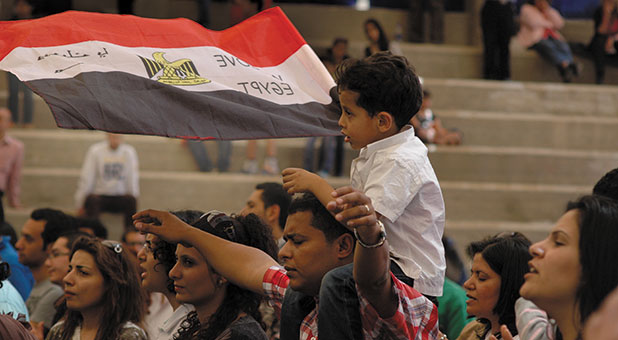Egyptian Christians Report Move of God Despite Persecution
The Middle-Eastern land known for its rich cultural heritage and its key role in Christian history teeters on the brink of disaster, with raging political unrest threatening to derail President Mohammed Morsi’s government in Egypt.
“It seems that President Morsi has simply put Egypt on the edge of a volcano that may erupt at any moment,” a Christian leader there says of the Islamic leader. “The rapid developments taking place in Egypt nowadays bring an image to mind—a man standing in the middle of a blowing sandstorm.”
Eight months after an uprising ousted dictator Hosni Mubarak in 2011, more than two dozen Coptic Christians were martyred and 200 injured when they protested the demolition of a church in Upper Egypt.
More chaos followed, sparking additional repression, economic instability and the departure of tens of thousands of Christians from Egypt. Today, attacks on Christ’s followers in that nation are particularly pronounced in rural areas, according to one church leader.
“Islamic extremism is the main persecution dynamic in Egypt,” says a researcher for Open Doors. “With the Muslim Brotherhood in control of the country’s legislative and executive power, Islam is becoming more visible.”
Yet amid such dire headlines, stories of a great awakening continue to emerge that bring smiles to the faces of countless believers in the gospel worldwide.
Signs of Renewal
A prime example is Kasr El Dobara Church, Egypt’s largest evangelical congregation, located in Cairo. With the U.S. Embassy next door, worshippers sometimes find tear gas canisters lobbed into their midst as daily battles take place outside between Islamic protesters and police. Yet over the past three years, attendance at Kasr El Dobara has swelled from 700 to crowds that regularly overflow the capacity of the 2,500-seat sanctuary. Church leaders set up closed-circuit TV broadcasts of the church’s five-times-a-week services to accommodate the throngs.
“The numbers of people are multiplying,” says church spokesman Fazil Khalil, an assistant to senior pastor Sameh Maurice. “They are coming from every side and every background—people we are not accustomed to seeing, people seeking God.”
And more than attendance is on the upswing. Khalil, other Egyptians and those who maintain outreaches to Egypt report a rise in prayer movements, interdenominational unity and a belief that God is about to visit Egypt in dramatic fashion.
“Historically, we know that every time there is political chaos and uncertainty anywhere in the world, we always see the church experiencing true revival,” says Shaddy Soliman, pastor of Every Nation Church in Lake Mary, Fla. Soliman regularly returns to his native country, with his most recent visit taking place last July, when Morsi was sworn into office as Egypt’s first democratically elected leader.
Soliman says that Muslims who once feared ostracism for visiting churches but who now worship openly with Christians and watch televised services are among the signs of such an awakening in Egypt. “I’m not saying they’re not risking a lot to do this, but I am saying this is a new era,” he says. “It’s greater than ever before, simply because this is the generation of Ishmael. These are the people the Bible talks about, who will receive the message that lasts.”
Another sign of renewal is a pair of gatherings that happened last October in the desert 60 miles north of Cairo. The first, aimed at teens and young adults, attracted more than 10,000 for three days of prayer, preaching and worship.
The second, a four-day rally called Count It Right, attracted 45,000, with an estimated 25,000 coming to Christ and 8,000 requesting follow-up visits from churches. Another 5,000 attended a parallel one-day festival in the Coptic Orthodox Cave Church, located in Cairo’s massive garbage dump.
Rather than being hidden from the potential backlash of extremists, Count It Right occurred in plain sight. More than 2 million people watched more than six hours of coverage broadcast to the Middle East, Australia and North America by a pair of Christian satellite channels.
Both rallies have proved fruitful, says Khalil, whose church served as the primary organizer. “We didn’t have enough ushers to go around praying with the people, with all those standing to ask God for forgiveness and ask Jesus into their heart,” he says. “It was a very tough time [in Cairo] because there was no security and thousands of people were running in the streets. We prayed, and everything went smoothly.”
Not only was the Holy Spirit’s presence notable at the rallies, but Khalil says the events prompted many who were thinking of leaving Egypt to remain so they can see how God will restore the nation.














































